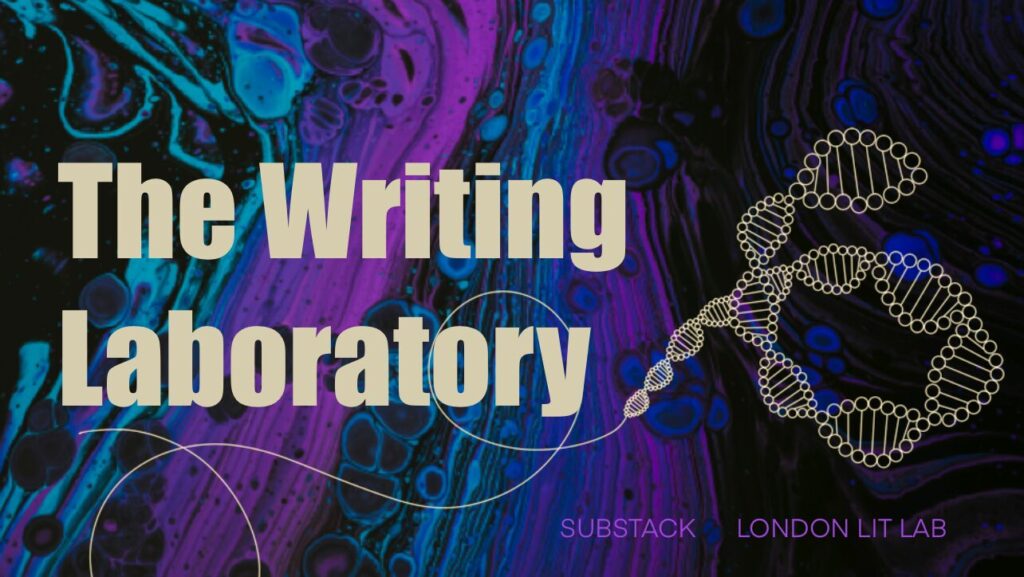Tania Hershman joined London Lit Lab in 2020 and teaches our online courses, Flash Fiction: The Tiniest of Stories, Hybrid Writing: Unbox your Words, and Science-Flavoured Writing.
Why does hybrid writing excite you so much? Can you name a few Hybrid pieces of writing to get beginners inspired?
I love the idea of “hybrid” writing because I’ve always wondered why it’s important to put a label on a piece of writing – what does it matter if it’s a poem or a short story, a novel or a memoir? For me, it’s just writing words in different shapes. When I came across this term, “hybrid” – which is not another label, it’s anti-label, it’s saying “you can’t grasp me, just be with me as I am” – it gave me permission to take this further in my own writing, to let go of what it “is” and just write what I need to write in the way I want to write it.
Here are a few of my favourite pieces of what might be called “hybrid writing”:
Regi Claire, (Un)Certainties
Adam Tavel, Revising the Waiting Room Sign
Ravi Mangla, Greenly, Everett and Marion, 1878-1903
Jan Fitzgerald, Place dinosaur in the oven
Could you talk a bit about why science, the experiment, and stepping into the unknown energize you?
Isn’t this what all creative writing is, an experiment, a stepping into the unknown? For me, science is just another framework for curiosity, for asking questions about the world – not necessarily about finding answers. I see every piece I write as an experiment. I am writing it for me, first, to entertain myself, to try and express something I have been thinking about, to tell my characters’ stories. I love using science as an inspiration in some way, it helps me not look too directly at the thing I am (or I think I am) writing about – because how often do we find that we are actually not writing about what we think we are? I learn from my own writing, I find things out, and how can we do that if we don’t step towards what we don’t know?
What would you say to someone who doesn’t read poetry?
As with other forms and genres, there’s no such thing as “poetry”, there are millions of poems all doing things in different ways, in their own ways. The poems I was made to read at school weren’t the kinds of poems that inspired me, but I am very glad to have re-found poetry a few years ago and fallen in love when my eyes were opened to everything a poem might be, especially to where they rub up against their close cousin, the short story.
People shouldn’t have to read anything if they don’t want to – but I do encourage everyone to try reading things they think they won’t like, to expand their horizons. It’s often assumed poems will be “difficult” to read, but I hope the ones I share in my workshops, and the way we read and discuss them, give people permission. It’s ok not to like a poem or other piece of writing, and we can learn as much from what work doesn’t speak to us as from our favourites.
You recently published a collaborative work: ‘On This Day She: Putting Women Back Into History, One Day At A Time’. Can you talk a bit about this?
Our mission at On This Day She – the Twitter account I created with fellow writers Jo Bell and Ailsa Holland in 2017, and our newly-published book – is to do our small part to rebalance history. This is not “women’s history” – it’s human history, with the women put back in, and so so many of them that our mission will never end!
We try to find a day that was important to the woman herself, rather than the day she was born or died. We include not just inspiring women but also women who were less than inspiring, because we believe women should be put back into history on equal footing with men. And men throughout history, as we know, did not always behave well.
I am constantly both encouraged and enraged by how many of these women I had never heard of! We continue to tweet about a different woman every day, from across the world, across all disciplines and time periods, and have an enormous list of women we haven’t even had time to add to our calendar yet. History has many gaps in it.
What are you currently working on?
I’m finishing a hybrid book on Time, a sort of chronomemoir. My editor has my second poetry collection, and my agent has sent my fictional-memoir-in-collage, the second hybrid book I’ve written, out to publishers. I’m also currently collaborating with my friend and fellow writer Pippa Goldschmidt on a collection of stories, essays and hybrids around the theme of women and science, which is very exciting!

